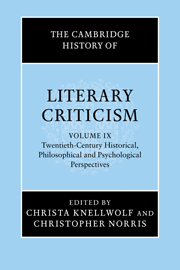Book contents
- Frontmatter
- Introduction
- HISTORY
- MARXISM AND POST-MARXISM
- FROM CULTURAL POETICS TO CULTURAL STUDIES
- PSYCHOANALYTIC APPROACHES
- GENDER AND SEXUALITY
- COLONIALISM, POST-COLONIALITY, NATION AND RACE
- MODERNITY AND POSTMODERNISM
- PHILOSOPHY, AESTHETICS AND LITERARY CRITICISM
- 23 Words and things in phenomenology and existentialism
- 24 Criticism, aesthetics and analytic philosophy
- 25 Italian idealism
- 26 Spanish and Spanish American poetics and criticism
- 27 American neopragmatism and its background
- 28 Ethics and literary criticism
- INTERDISCIPLINARY APPROACHES
- Bibliography
- Index
- References
26 - Spanish and Spanish American poetics and criticism
from PHILOSOPHY, AESTHETICS AND LITERARY CRITICISM
Published online by Cambridge University Press: 28 March 2008
- Frontmatter
- Introduction
- HISTORY
- MARXISM AND POST-MARXISM
- FROM CULTURAL POETICS TO CULTURAL STUDIES
- PSYCHOANALYTIC APPROACHES
- GENDER AND SEXUALITY
- COLONIALISM, POST-COLONIALITY, NATION AND RACE
- MODERNITY AND POSTMODERNISM
- PHILOSOPHY, AESTHETICS AND LITERARY CRITICISM
- 23 Words and things in phenomenology and existentialism
- 24 Criticism, aesthetics and analytic philosophy
- 25 Italian idealism
- 26 Spanish and Spanish American poetics and criticism
- 27 American neopragmatism and its background
- 28 Ethics and literary criticism
- INTERDISCIPLINARY APPROACHES
- Bibliography
- Index
- References
Summary
– ‘The rest is silence’, said Hamlet.
– ‘Le rest est littérature’, echoed Verlaine.
– ‘Un no se qu0é que quedan balbuciendo’
(S. Juán de la Cruz)The last decades of the nineteenth century and the early years of the twentieth century saw a major change in Spanish American arts and letters: Spanish intellectuals began to look north, reversing the European romantic artists’ movement towards the south; at the same time the state of mutual ignorance that had existed before the 1890s between Spain and Spanish America was transformed by the springing up of new, fertile cultural relationships. This development was symbolically marked by the disintegration of the old Spanish empire in 1898, when the last of the old Spanish colonies finally gained independence. After 1898, intellectuals no longer saw Spain as the repressive power, they began to see it instead as a victim of emergent North American imperialism, already felt to be a threat to Spanish America.
Both Spanish and Spanish American writers were imbued with European philosophical, literary and artistic ideas. Spanish painters received grants to study in Europe, especially Italy; Zuloaga established himself in Paris; Sorolla won the Grand Prix of the Paris exhibition of 1900; Picasso and Gris made decisive contributions to the cubist revolution in Paris. In Spanish America, French symbolism and parnassianism in particular deeply influenced those forerunners of ‘modernismo’, such as the Mexican Gutiérrez Nájera (1859–95), the Colombian Asunción Silva (1865–96), and the Cuban independentist hero Martí (1853–95). In Spain, the members of the 98 Generation also delved into European literature and philosophy.
- Type
- Chapter
- Information
- The Cambridge History of Literary Criticism , pp. 349 - 358Publisher: Cambridge University PressPrint publication year: 2001



